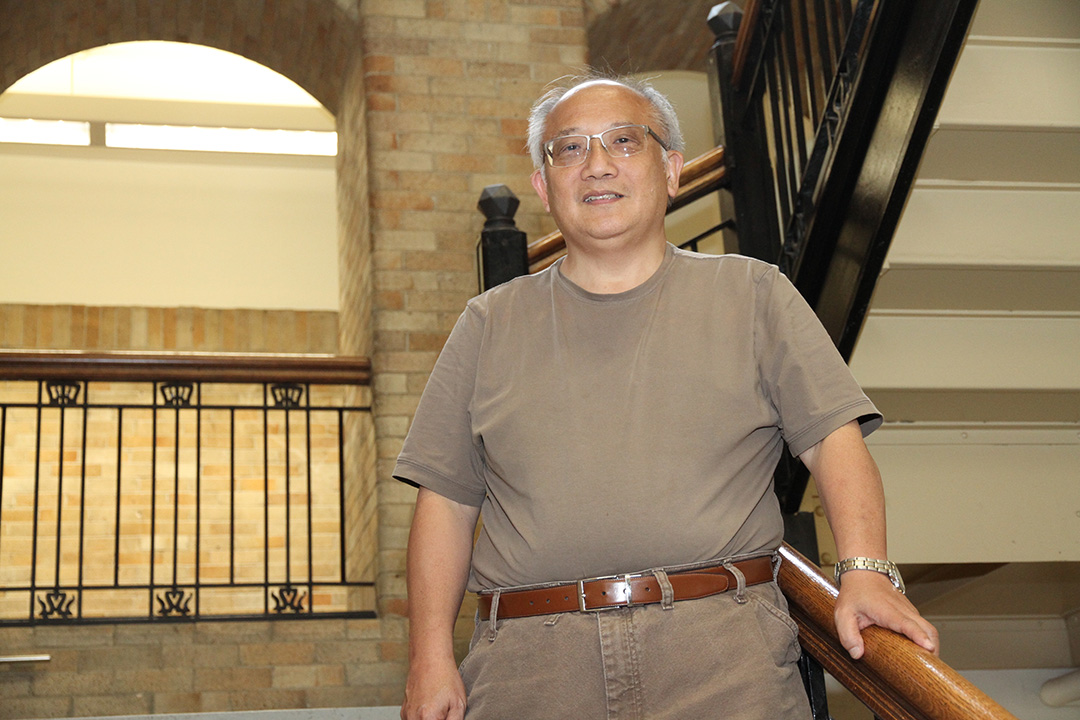
A lifetime of achievement
He is an internationally renowned researcher with a remarkable resume spanning 38 years, has more than 500 articles published in high-profile scientific journals, and has accumulated an abundance of awards and accolades.
By James ShewagaSo at the age of 64, what continues to power professor John Tse’s passion for discovery?
“It’s curiosity,” said Tse, a faculty member in the Department of Physics and Engineering Physics at the University of Saskatchewan. “I always think doing research is like solving a puzzle. I want to learn something new every day. My brain is like a sponge: I soak up everything. First thing in the morning, I read science news and I get interested in one subject and I start to study it. And if I am capable, I just start doing it. It’s my curiosity and my personality.”
The personable professor added to his lengthy list of distinctions earlier this summer when he received the honorary title of distinguished professor at the U of S—along with professor James Hendry in the Department of Geological Sciences—honouring a lifetime of exceptional achievement in research, scholarly or artistic work.
“It definitely is an honour to be awarded the highest award of the university and it is peer recognition that is more important than the title,” he said.
Previously, Tse was awarded a Doctor of Science from the university in 2015, earned the Distinguished Researcher Award in 2010, and was inducted as a Fellow of the Royal Society of Canada in 2008—one of the highest honours a scientist can receive in the country—after beginning back-to-back seven-year appointments as a Canada Research Chair in 2004 to start his 15-year career at the U of S.
Tse came to the university after serving 25 years in Ottawa with the National Research Council (NRC), where he achieved the highest rank of principal research officer in 2000. Tse first came to the U of S during that time to help establish the new synchrotron in the world-renowned Canadian Light Source research facility.
“I came to this university basically to help build the synchrotron and I was the chair of the oversight committee when the synchrotron was built from 1999 to 2005,” said Tse. “The synchrotron has been important all my life. I started with Dr. Mike Bancroft, who was the first director of the synchrotron here. So, I have been working with the synchrotron for a long time and the synchrotron has been a major tool of my research for a long time.”
Tse’s research has helped spark advances in research ranging from energy storage and superconductors, to his team’s recent discovery of how the Earth can create water thousands of kilometres deep inside the planet, from liquid hydrogen reacting with silica under high pressure and high temperature.
“There are different theories of how water got onto Earth, and we are contributing to that knowledge. How much water is formed and under what condition and how long ago, that still has to be investigated,” said Tse. “So, I have an extremely broad area of research, from chemistry to geophysics. My major interest right now, working with professor (Yuanming) Pan in the Geological Sciences department, is to understand how magma flows and the chemical reaction of magma with water and other minerals, in the Earth’s mantle. So, I am going into a completely new field of geoscience, with absolutely no background.”
That, however, is nothing new for Tse. You see, one of the top researchers in the U of S physics department doesn’t actually hold a physics degree.
“All my degrees are in chemistry, so I learned along the way,” said Tse, who earned his PhD in chemistry at the University of Western Ontario in 1980 before joining the NRC that year. “I started off as an experimental chemist and circumstances required me to learn physics, so I learned how to do it. And over the years I have refined myself, by learning from some very good colleagues, in particular graduate students and post-docs. I make no bones about it: I learned everything from my post-docs!”
To be sure, students and research collaborators at the U of S, across Canada and around the globe have learned plenty from the popular professor, who regularly gives lectures world-wide, is an adjunct professor at Western and the University of Ottawa and works internationally with institutions in Japan, China and the United States.
While he still relishes conducting research, he also enjoys teaching the next generation of researchers.
“The reason that I joined the university is that I have a passion to teach,” said Tse, who was recently appointed a U of S Centennial Enhancement Chair for another five years. “Even when I was at NRC, I figured I would end up at a university at some date. It just happened earlier than I expected. I always told my wife: If I can sleep in an airport, I can do anything.”

